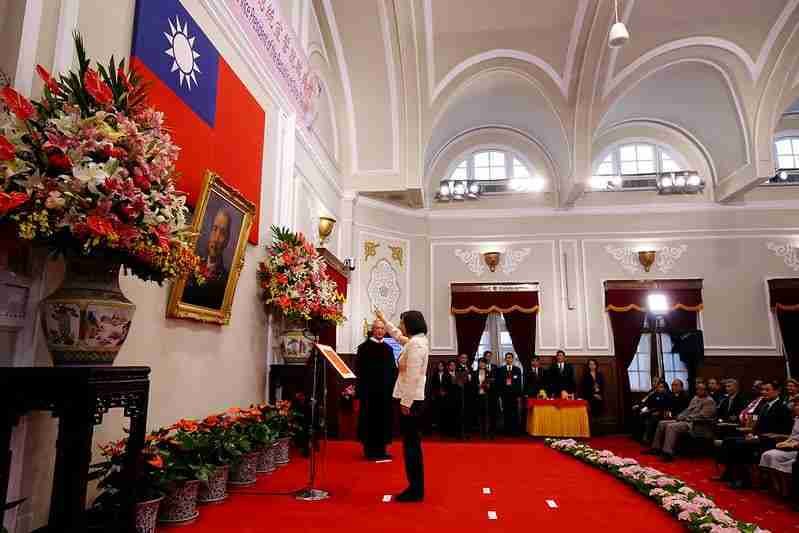One of the biggest political stories of the year so far has been Taiwan’s President Tsai Ing-wen securing a second term in a sweeping electoral victory in January which saw her frontally challenging the might of China. Her victory allowed her to underscore that “Taiwan is showing the world how much we cherish our free democratic way of life and
how much we cherish our nation.” The target of this barb was very clear both in Taipei and in Beijing and as the two recalibrate their relationship, there would be a recognition that perhaps China-Taiwan ties would never be the same again.
In her victory speech, Tsai challenged China to give up brandishing threats to the island, underlining that “peace means that China must abandon threats of force against Taiwan” and hoping that “the Beijing authorities understand that democratic Taiwan, and our democratically elected government, will not concede to threats and intimidation.” It’s a tall order, of course, and Tsai knows it. But she is a politician who till some time back was facing certain defeat with low wages and controversial pension reforms pulling down her approval ratings to as low as
15 per cent. This had resulted in Tsai and her Democratic Progressive Party (DPP) suffering a crushing defeat in the November 2018 local elections while the opposition Kuomintang (KMT) gaining traction primarily due to economic issues. KMT and its leader Han Kuo-yu has been promising closer economic ties with Beijing for economic betterment. Meanwhile, Beijing was busy intimidating Taiwan and Tsai, gradually taking away the limited number of diplomatic partners of Taiwan, banning Chinese tourists from visiting the island and showcasing its military muscle by intruding its air and naval power into Taiwan’s vicinity. In a sign of China’s growing economic heft around the globe, only 15 countries now recognise the self-governing territory of Taiwan as a sovereign nation.
As a result, Tsai would have fought these elections with her back to the wall. But that was not to be as Taiwan’s relationship with China emerged as the central issue in the election campaign and made Tsai the natural choice for most Taiwanese. Beijing’s mishandling of the situation in Hong Kong, in particular, galvanised the Taiwanese voters in defending their national identity. Beijing’s much-touted one country, two systems formula is viewed as a failure in Hong Kong and in Taiwan, only 4.5 per cent of Taiwanese currently support the idea of “unification” with China.
Last year when Chinese President Xi Jinping called upon Taiwan to adopt Hong Kong’s “one country, two systems” model as the basis for talks on reunification, Tsai was categorical in suggesting that Taiwan would “never accept one country, two systems.” Not surprisingly, Tsai channelled this sentiment through the use of the slogan “Hong Kong today, Taiwan tomorrow” in her re-election campaign with great effect.
The US has welcomed Tsai’s victory as a demonstration of Taiwan’s “robust democratic system,” highlighting Taiwan “as a shining example for countries that strive for democracy, prosperity and a better path for their people.” Though the US is legally bound to provide Taiwan means to defend itself, Washington has had to traditionally perform a delicate balancing act when it comes to its ties with Taiwan and China.
Yet, the Trump Administration’s hardline approach towards China has suited Taiwan well. Trump is viewed as one of the most Taiwan friendly US presidents since Richard Nixon. Not only did Trump talk directly with Tsai on the phone after the 2016 election, in a first for a US president or president-elect since at least 1979, he also approved the sale of 66 F-16 fighters to Taiwan and the US naval ships have more regularly sailed through the Taiwan Strait in the last three years.
Tsai has been very keen to cultivate new partners and her New Southbound Policy (NSP), has sought to enhance links with countries across South and Southeast Asia. India is a natural partner in more ways than one. At a time of US-China trade tensions, Taiwanese firms are keen to take advantage of India in various sectors such as technology, renewable energy, electric vehicle and agriculture.
This is reflected in Taiwan’s decision to open four trade offices in India in the last few years. As Taiwan looks at India more closely, New Delhi needs to reciprocate and welcome Taiwanese investment even prioritises it. And closer interactions between the two on strategic matters are now the need of the hour.
Tsai has made it clear said Taiwan should “learn a lesson” from Hong Kong: “If we don’t insist (on maintaining Taiwan’s independence), we’ll be losing everything we have now.” Her views have been endorsed by the Taiwanese voters. But Beijing is in no mood to relent, as official Chinese reactions to Tsai’s victory underscore.
The situation across the Taiwan Strait is likely to remain complex for the foreseeable future. Taiwan has made its choice clear that it won’t budge on the question of its independence even if it has to stand mostly alone in the world. There is much to cherish and respect in that approach even as it is now time for India to galvanise its diplomacy towards Taiwan.
Professor Harsh V. Pant is Director, Studies and Head of the Strategic Studies Programme at Observer Research Foundation, New Delhi.


